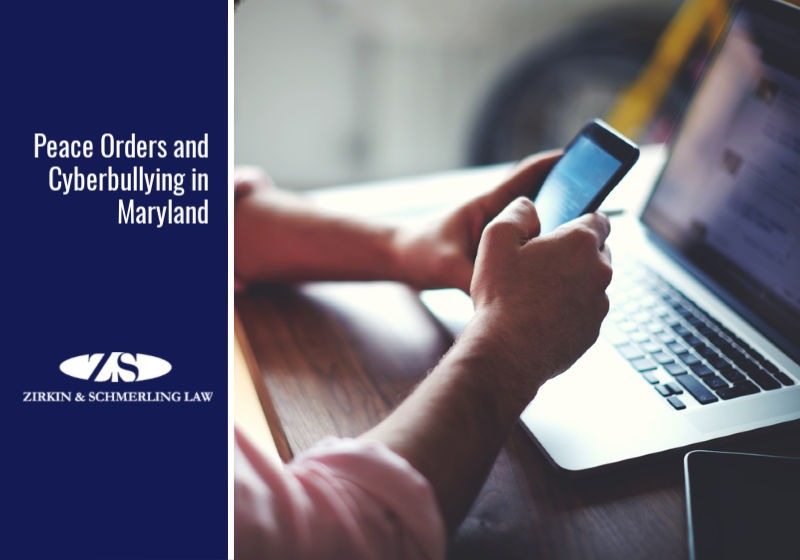
Does your child have a cyberbully? Or do you? Bureau of Justice statistics show that about 15% of U.S. high school students are cyberbullied each school year and a staggering 40% of adults have experienced cyberbullying too.
Cyberbullying involves bullying, shaming, threatening, and stalking that occurs over electronic devices. It might take place in public right before everyone’s eyes on Instagram, or it might happen more privately through text messages or even voicemails. Here in Maryland, we have laws that help people stand up to cyberbullies and hold them responsible for their actions.
Maryland offers something called a peace order, which isn’t available in all states. A peace order holds someone accountable for harassment, stalking, and other types of behavior that destroy a person’s safety and peace of mind. If a judge issues a peace order, the cyberbully will be notified that they need to leave you alone and may face penalties for failure to obey the order.
Here’s How to Obtain a Maryland Peace Order
It takes a few steps to secure a peace order. Start by contacting a Maryland attorney who is qualified to assist you with the process. This is the best way to ensure that you don’t inadvertently do something to ruin your chances of getting the order.
Next, file a peace order petition with the court to request a hearing. The hearing will determine whether the cyberbully’s actions create an urgent need for a peace order. You’ll need to cite a specific action by the cyberbully within the past 30 days.
In Maryland, Peace Orders require one of the following conditions to be met:
- You received serious bodily harm or are in fear of imminent serious bodily harm.
- You have been assaulted or raped. This includes threatening to harm you and intentionally frightening you.
- Someone has trespassed on or maliciously destroyed your property.
- You have been visually surveilled in a private place without giving consent.
- You have been the victim of the kinds of crimes that show a persistent pattern of conduct, composed of a series of acts over time, that shows a continuity of purpose. This would include Harassment, Stalking, Telephone Misuse, Electronic Communication Misuse, Revenge Porn, and Visual Surveillance.
The law that criminalizes Electronic Communication Misuse is designed to stop Cyberbullying.
If the judge issues a peace order, it will be temporary at first and last up to 30 days. But don’t worry – this is a good start. It means the cyberbully must stop posting things online, threatening you, and contacting you. It also forbids them from trying to visit you in person.
Next, there will be another hearing within seven days of the temporary order being issued. As long as a judge determines that it’s more likely than not that the cyberbully has committed or will commit a prohibited act, a final peace order will likely be issued. A Final Peace Order can last for as long as six months.
Peace Orders are Not the Same as Protective Orders
Most people are more familiar with a protective order, which is similar. But the big difference between a protective order and a peace order surrounds your relationship with the other person.
A protective order involves someone you live with, like a spouse or family member. A peace order doesn’t require you to live with the person and applies to anyone out in the world who might harass, threaten, and/or physically harm you. Sometimes, you barely know the person against whom you’ve brought the peace order.
To be clear, you can obtain a peace order regardless of whether a cyberbully has ever followed through on a threat. Don’t wait for someone to harm you. Below, we’ll look at some examples of cyberbullying where a peace order could be very helpful.
Common Situations That Call for a Peace Order
You can take action to stop online bullying. If a cyberbully is targeting you or your child, seek a peace order to help put a stop to it. Here are some common situations where people seek peace orders.
- A classmate is posting personal, private information about your child online.
- Someone is trying to “out” you or your teenager online for being LGBTQ.
- The bullying is taking place on Instagram, which is the world’s #1 platform for cyberbullying.
- Constant photos/messages on Snapchat or Twitter are humiliating for your child.
- There are videos on YouTube that show your disabled child being teased or shamed.
- You’re receiving a frightening series of threatening texts or phone calls.
- After buying/selling something on an online platform like Facebook Marketplace or Craigslist, someone won’t stop contacting you.
Cyberbullying sometimes arises in unexpected places, which is why the official U.S. government website StopBullying.com advises adults to consider these important factors:
Persistent: It happens online, meaning it can occur 24/7 and really wear you down.
Public: Cyberbullying remains almost permanently on the internet, where anyone can see it.
Parents don’t notice: Cyberbullying can be hard for adults to detect, so we must help children recognize it and understand that they don’t have to tolerate it.
For more information about cyberbullying and obtaining a peace order, connect with a qualified Maryland attorney. It’s time to stand up to your cyberbully and reclaim your peace of mind.
Have a Legal Question About Peace Orders and Cyberbullying? We Have Answers
For issues involving peace orders and cyberbullying, the attorneys at Zirkin and Schmerling Law can help. Contact us or call us at 410-753-4611 to set up an appointment with one of our attorneys today.
